
Alphabetical Menu
Chronological Menu
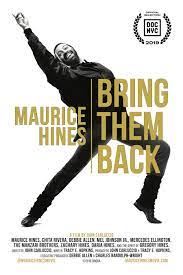
Maurice Hines: Bring Them Back is an intimate and revealing documentary biopic of Maurice Hines, Gregory Hines' older brother. He wore many hats throughout his life as a tap dancer, choreographer and actor. Director John Carluccio goes above and beyond by not just providing the audience with information about Maurice Hine's work in the arts, but also about his childhood and his relationship with his family. Most importantly, though, Carluccio captures Maurice's charisma, emotional maturity and sense of humor through candid interviews with Maurice himself. Everyone has a life front stage and back stage, so it's testament to Carluccio's strength as a filmmaker and his trust in Maurice and Maurice's trust in him that the documentary manages to peek behind its subject's curtain. If you thought you knew Maurice at the beginning of the doc, you'll be surprised at how much you'll get to know him by the end of the film and see him in a new light as a human being, warts and all. The evolving dynamics of his relationship with his younger, more well-known brother, Gregory, remains the heart and soul of the film, and makes for a moving experience that's relatable to anyone who's had a rocky relationship with a sibling. It's also very well-edited with just the right pacing so that not a single moment drags. You don't have to be a dance aficionado to appreciate this doc because it's the kind of doc that transcends its subject and brings him to life. At a running time of 1 hour and 32 minutes, Maurice Hines: Bring Them Back finds just the right balance between entertaining the audience and provoking them emotionally as well as intellectually. It opens February 2nd, 2022 at IFC Center via Grasshopper Films. 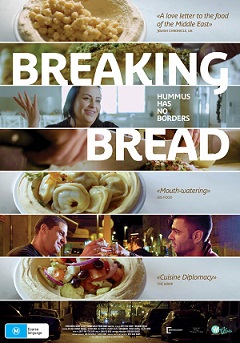
Breaking Bread might be one of the most uplifting documentaries about Arabs and Jews in Israel. It centers on the Jewish and Arabic chefs who come together annually for the A-Sham Arab Food Festival in Haifa. They put their religious and ethnic backgrounds aside and focus instead on making the delicious food for the festival. The same can be said about the documentary itself because director Beth Elise Hawk leaves the political conflicts aside while celebrating the food and the chefs as well as their passion for cooking. There could've been some more insight into the true origins of what's known as the Israeli Salad which is also known as Arab Salad. Which culture did the salad originate in? Breaking Bread doesn't answer that question nor is it interested in it because it doesn't matter. What matters are the people and the food that transcends all boundaries and conflicts while uniting everyone. As someone in the documentary wisely states, food is a step that paves the way toward peace even if it's not necessarily the solution.
Director Beth Elise Hawk includes interviews with both Jewish and Arabic chefs including Dr. Nof Atamna-Ismaeel, the first Arab to win MasterChef in Israel, Shlomi Meir, Osama Dalal, Ilan Ferron and many more. You get to know just enough about their background to humanize them. Hawk should also be commended for interweaving some humor in the film, including a husband and wife chef team, Soshi and Fadi Karaman who own Hummus Fadi. Their witty banter provides some levity, and the story of how they met is fascinating enough for them to be the subjects of another documentary. The real star of this doc is the scrumptious food which speaks for itself. The sights of the food themselves speak louder than words. You'll learn about Middle Eastern foods that you may not have heard about before and will be tempted to seek out and try. This is precisely the kind of foodie documentary that will whet your appetite, and the exquisite cinematography of the preparation of the dishes are part of what makes the experience mouth-watering. Don't expect to get any recipes, though. You'll need to go to Israel to taste the wonderful-looking dishes there yourself. At a running time of 1 hour and 25 minutes, Breaking Bread is a captivating and mouth-watering delight that will nourish your heart, mind and soul. It opens at Quad Cinema via Cohen Media Group. Jackass Forever 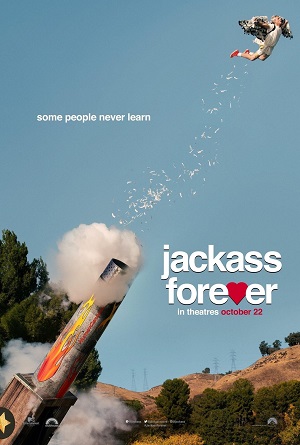 The Jackass team, Johnny Knoxville, Steve-O, Wee Man, Preston Lacy, Danger Ehren, Dave England, and Chris Pontius, among new members who join them, return for yet another set of dangerous pranks that are meant to shock and generate laughter. This time around, the pranks range from Johnny Knoxville getting electrocuted to someone drinking pig semen to a swarm of bees stinging someone's genitals. If you're a fan of low-brow, gross-out, juvenile humor that tries too hard to funny and disgusting, you'll at least find Jackass Forever to be entertaining as a guilty pleasure. Visual gags without wit, though, get exhausting pretty quickly. Director Jeff Tremaine and the brave stunt men and women deserve credit for pushing the envelope as much as they can and being unashamed of how low they will go for a laugh. A fart gag involving someone's farts being ignited underwater goes on for too long and isn't even that funny when shown again in slow motion. Then there's the use of venous insects like bees, spiders and a scorpion as part of some pranks, but they're more horrifying than hilarious. You'll be tempted to shield your eyes from the horror during the spider prank if you're arachnophobic. There are more penises on screen than you'd expect in an R-rated movie. It almost feels like it's crossing the NC-17 line at times. There are too many images that you wish you could unsee and won't believe your eyes. What makes the film even less funny is that the Jackass team laugh a lot at their own pranks which makes them seem full of themselves. That's what they're known to do, to be fair, but their schtick doesn't quite work unless you're laughing with them or at them. That said, they do have great chemistry together and seem to be having a good time at least. Whether or not you'll feel the same way all depends on how much you can laugh at witless, dumb and repetitive visual gags that involve people getting hurt or risking serious injury. Do you find someone being injured by a cactus to be funny? Will you laugh at their bleeding back? Then by all means see Jackass Forever. Perhaps the best way to enjoy Jackass Forever is with a group of friends while drunk or high. Even at a running time of 1 hour and 36 minutes, it still feels too long and would benefit from being at least 20 minutes or, better yet, 1 hour and 36 minutes shorter. See it only if you're a die-hard Jackass fan who can easily and ashamedly experience Schadenfreude watching cude, rude and lewd pranks without wit. 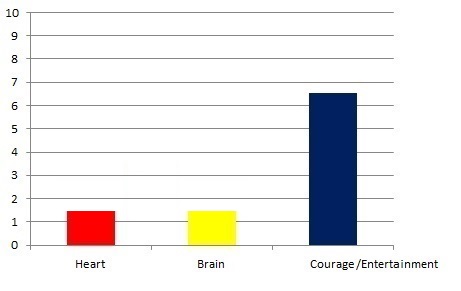 Last Looks 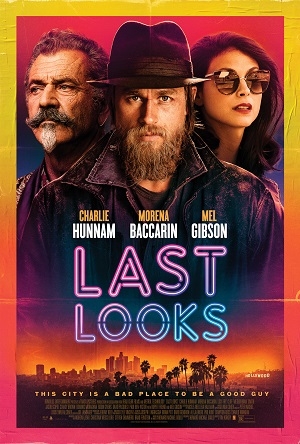 Charlie Waldo (Charlie Hunnam) comes out of retirement as a private investigator to investigate the murder of the wife of Alastair Pinch (Mel Gibson), a TV actor in Hollywood who's accused of her murder. Lorena (Morena Baccarin), Charlie's ex-girlfriend, still works as a PI and gives Charlie his new assignment to help prove Alastair's innocence. Others who want to clear Alastair's name include the TV show's producer, Wilson (Rupert Friend). The screenplay by Howard Michael Gould, based on his novel of the same name, struggles to walk a fine line between comedy, mystery, suspense, drama and satire. What ensues is a tonally uneven and meandering film that tries to be campy and funny with attempts at dark humor, but the beats rarely land. Gould does a decent job of introducing the character of Charlie to the audience as he lives in a trailer in the middle of nowhere as you gradually learn more about his past and how he ended up there without flashbacks. Later on, though, there are some brief flashbacks which become repetitive. Charlie comes across as an interesting character with a lot of baggage. Juxtaposed with Alastair, though, they're both like oil and water. Alastair, with an accent as fake as Benoit Blanc's accent in Knives Out, is like a giant ball of energy. Unlike Benoit Blank, though, he gets increasingly annoying as the film progresses. Unfortunately, despite a murder mystery that's initially intriguing, it becomes less and less suspenseful as it grows more convoluted and over-the-top. There's nothing wrong with going over-the-top per se. Knives Out accomplishes that skillfully and does the trippy Under the Silver Lake and Kiss Kiss Bang Bang. A far better mystery thriller, though, that also takes place in Hollywood is The Long Goodbye which Last Looks pales in comparison. Last Looks doesn't quite go far enough into outrageous humor or satire nor does it work on any other level either. The relationship between Lorena and Charlie feels like extra padding in an already overstuffed film. Charlie Hunnam gives a decent performance which helps to ground the film every once in a while, but he's undermined by the dull screenplay. Then there's Mel Gibson's off-the-wall performance with a whacky accent that's distracting and nauseating. His mustache becomes a character in itself even more so than Hercule Poirot's. Just as expected, Alastair suffers from alcoholism, but his character arc to cure it by just drinking water feels contrived. The same can be said about the chemistry between him and Charlie which isn't palpable enough. On a positive note Morena Baccarin is just as graceful as Gal Gadot and a far better actres with much more charisma to boot. It's too bad that Last Looks doesn't give her enough to do. This is yet another B-movie that approaches the 2 hour mark which would have benefited from a leaner, 90-minute cut. At an overlong running time of 1 hour and 51 minutes is an overstuffed, undercooked and tonally uneven mess. 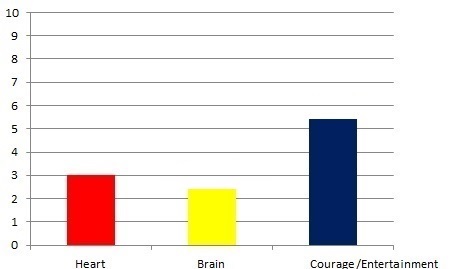 Lingui: The Sacred Bonds 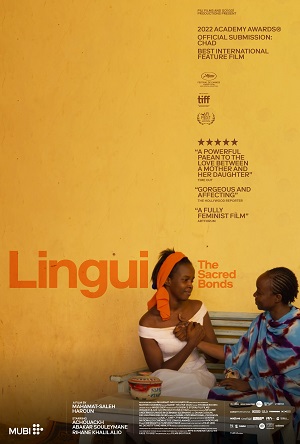 Amina (Achouackh Abakar Souleymane) raises her 15-year-old daughter Maria (Rihane Khalil Alio) alone on the outskirts of N’Djamena, Chad. When Maria announces that she's pregnant, Amina does everything she can to get her an abortion despite that it's against the law. She also tries to find out who got her pregnant and to hold him accountable. Lingui: The Sacred Bonds has what seems like a lean and simple plot, but it becomes increasingly complex. Writer/director Mahamat-Saleh Haroun takes a mostly cinema verite approach to telling the narrative as he introduces Amina as she works her day job selling stoves and struggles to make ends meet. The audience gradually learns more and more about Amina's life without flashbacks to the time when she was married to her husband who left her years earlier. Instead, Haroun keeps the narrative focused on Amina's desperate attempts to get an abortion for her beloved daughter and on how Maria's pregnancy out of wedlock reacks havoc on her life. Even Maria's school kicks her out. What transpires after that and whether or not Amina succeeds in finding someone who's willing to abort Maria's baby won't be spoiled here, but it's worth mentioning that the screenplay maintains a sense of naturalism for the most part, except for one scene which goes into very dark territory all of a sudden as Lingui: The Sacred Bonds briefly veers into a different kind of genre. That unevenness is ephemeral, though, and a minor misstep in an otherwise genuinely heartfelt film that sees and treats its characters like human beings. Fortunately, the performances by Achouackh Abakar Souleymane and Rihane Khalil Alio add to the film's naturalism and allows it to be further grounded in humanism, especially in warmth. You can palpably sense the love, compassion and concern that Amina has for her daughter. Another character also displays her compassion in a very moving way. Kudos to Haroun for not judging Amina and Maria; instead he lets the audience judge them if they wish to. How the audience chooses to just Amina and Maria's actions is what's left to the audience's interpretation based on their own projections. What's crystal clear from the get-go is that Amina and Maria are decent human beings and also justifiably indignant which they have every right to be. The sensitive, schmaltz-free screenplay along with the raw performances help the audience to care about what happens to them and to understand how both of them feel and where their feelings come from. It's refreshing to see such strong roles for women and to see female characters behaving heroically while trying their best to conquer adversity while standing up for themselves. Even the cinematography feels natural as well as the mostly slow pace. The third act feels a bit rushed in terms of pacing and contrived like a fairy tale, though, but at least it doesn't tie everything up too neatly and still leaves some room for the audience to use their imagination to fill in the gaps. At a running time of 1 hour and 27 minutes, Lingui: The Sacred Bonds is thoroughly engrossing, gripping and tender. 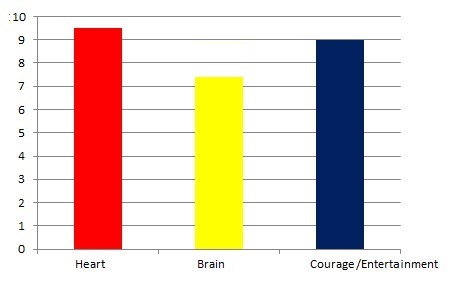 Moonfall 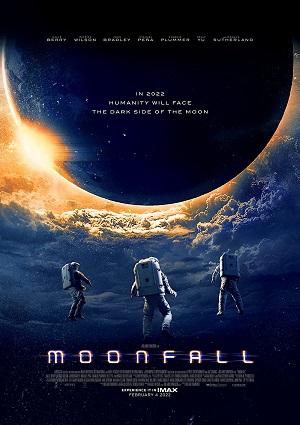 A mysterious force knocks the moon out of its orbit and headed straight toward a collission with Earth. Jo Fowler (Halle Berry), an employee at NASA, teams up with a former colleague, Brian Harper (Patrick Wilson), and a conspiracy theorist, K.C. Houseman (John Bradley), on a mission to prevent the Earth's imminent destruction before it's too late. If Moonfall were funnier, satirical and campy in tone, it could've been as fun and entertaining as Lake Placid or the recent end-of-the-world satire, Don't Look Up. Instead, the screenplay by Roland Emmerich, Harald Kloser and Spencer Cohen takes a more serious tone and runs with it while adding a little comic relief every now and then. The dialogue sounds stilted and clunky more often than not, and the exposition isn't very effective because it's hard to buy anything that happens, even within the film's internal logic--or rather, lack of logic. None of the characters feel like human beings, but rather like pawns to move the plot forward. There are too many characters to boot, and none of them are particularly memorable or stand out. Cue the plot holes and implausibilities which pile up pretty quickly, especially during the third act that goes off the rails in a direction that's almost, but not quite, dumb in an amusing sort of way. Dumb fun could work with the right tone and direction, i.e. the aforementioned Lake Placid. Moonfall has more in common with the bonkers Speed 2: Cruise Control because both films fall flat in both tone and direction. Speed 2: Cruise Control at least had unintentional humor and an over-the-top villain played by an over-the-top Willem Dafoe. There are no bad laughs, just a lot of cringe in this uneven and dull mess of a mindless blockbuster. The real star of the film is the CGI effects which are pretty decent when they show up, just as expected, in the second hour. If all you want to see is destruction, you'll at least see plenty of that, but it comes with diminishing returns. Those scenes are slightly thrilling on a palpable level, especially on an IMAX screen. None of the actors get to shine, and even Halle Berry doesn't get much to do other than to repeat stilted lines of dialogue, most of which is expositional. At an overlong running time of 2 hours, Moonfall is a bloated, silly and cringe-inducing spectacle that's as outrageously bonkers and mindless as Speed 2: Cruise Control minus the bad laughs and campiness. Some films are only a guilty pleasure while high and become a cult classic nonetheless. Moonfall, unfortunately, isn't one of those films. 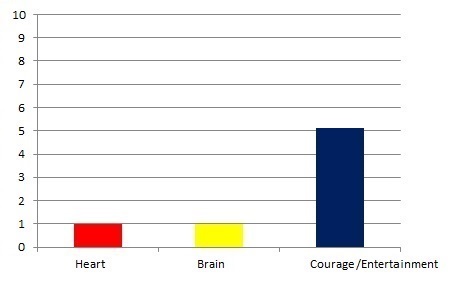 The Worst Person in the World 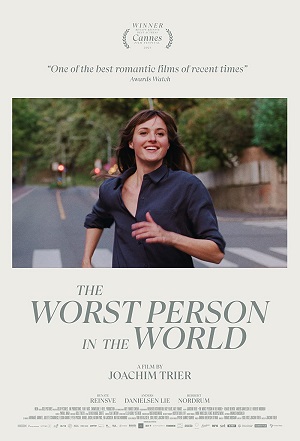
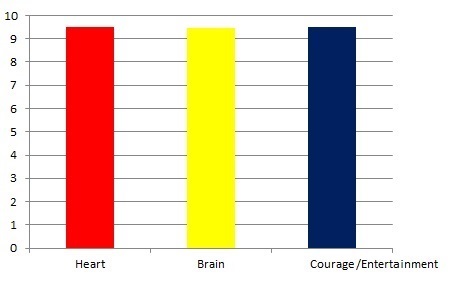 |